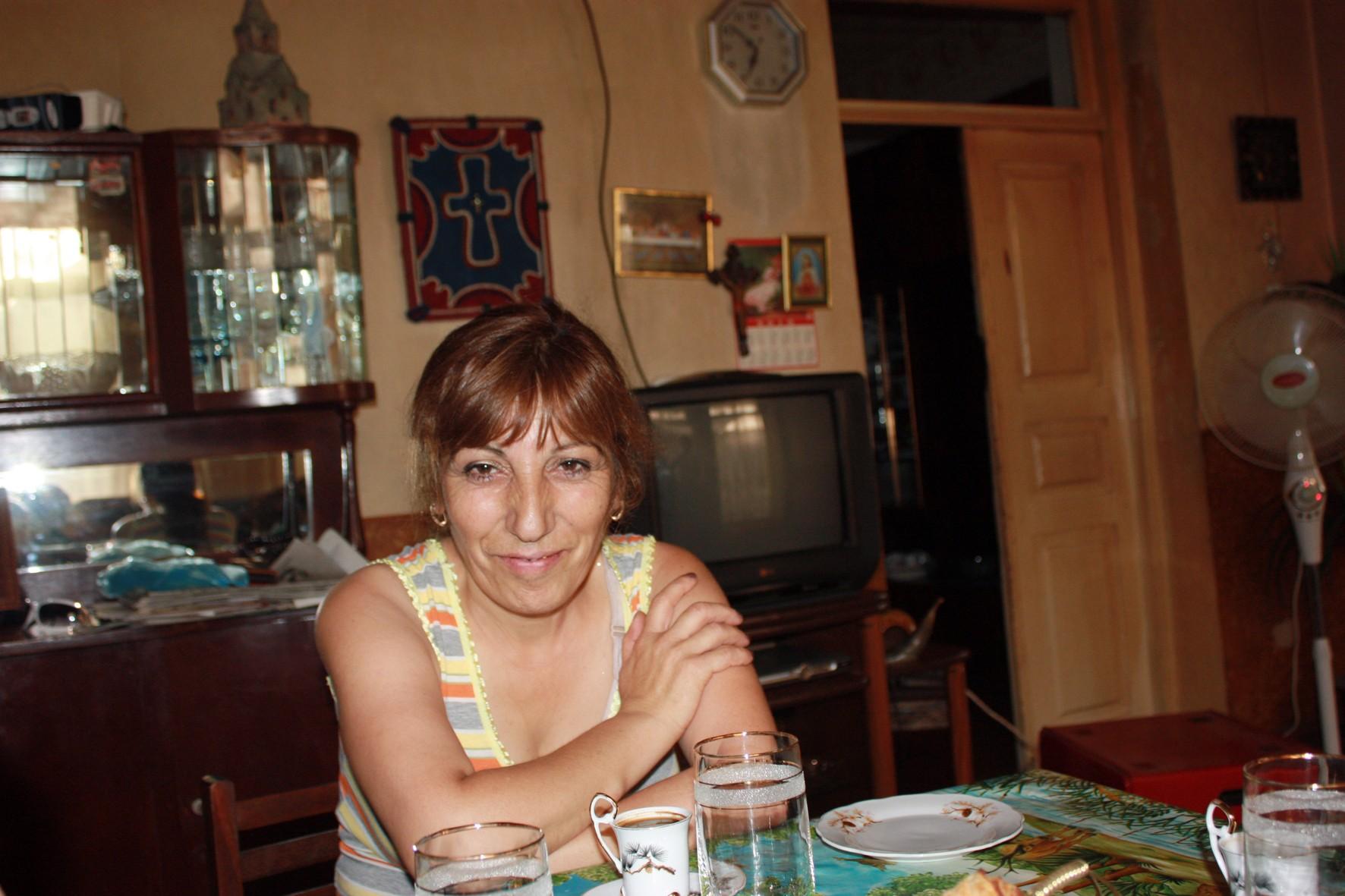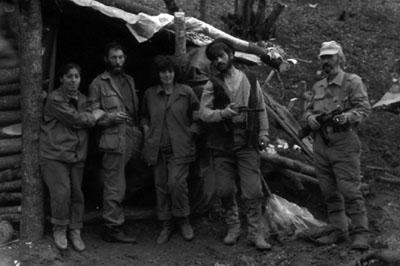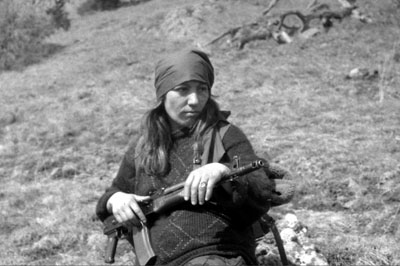
Melsida Harutyunyan: Artsakh War Veteran Ready to Fight Again
"I guess it's that wild and crazy Mshetsi blood in me"
“I was sitting in the helicopter, we had just taken off. I remember that just then I looked down at my father below. He slapped his legs. Up till then, they thought I was joking. Even my brother was at a loss. He didn’t know what to do.”
This is how Melsida Harutyunyan, a fighter in the Artsakh War, recollects the event. Her relatives had never believed that she was capable of going off to Artsakh, and to some of the places where the war was hot and heavy, at that.
Left as a nurse but wound up a frontline fighter
Melsida left for Artsakh as a nurse, but from the get-go she wanted to be where the action was, on the frontlines. She participated in the battles to liberate Shushi, Shosh, Lachin, Karvatchar and Martakert, and fought in Shahumyan for one and a half years, behind enemy lines.
Melsida Harutyunyan was born in 1959 in Verin Vedi, Ararat Marz. She graduated high school in 1976 and then went on to graduate from the Accounting Technical School. She then found work as a senior accountant at Yerevan’s Physics Scientific Research Institute.
In 1986, she moved to Russia with her Russian husband. In 1991, when fighting broke out in Artsakh, she returned to Armenia.
It was in October, 1991, that she made her way to the village of Shosh in Artsakh with a volunteer unit. : Snow had blanketed the land. Melsida took a wounded Armenian soldier to the village barn to tend to his wounds.
Azerbaijani forces had launched their assault. Their guns had ripped open the roof of the barn. Melsida spent two days in the barn, looking after the Armenian soldier. The enemy soldiers were close enough to hear them talk.
“I was lucky. The Turks never entered the barn. The wounded soldier died from loss of blood,” she recounts. Later, Armenian soldiers came and escorted her out.
Requests frontline action from Komandos
In March, 1992, Melsida and her unit went to Stepanakert and saw Arkady Ter-Tatevosyan (the famous “Komandos”). “Komandos ordered me to report to the Stepanakert hospital to help out. I started to cry. I told him I wanted to go to the frontline and that I hadn’t come all this way to work in some hospital,” she says, adding that Komandos asked her if she wasn’t afraid of getting taken hostage by the Turks. “I’ll kill myself before being captured,” was my answer. Nevertheless, the commander sent me to the hospital.
Melsida picked up her nursing skills on the job, in the forest. It was in the hospital that she saw her first surgery and it made her queasy. Afterwards, she performed field surgergy, pulling out shrapnel and bullets. Often, she never wore surgical gloves to save time.
 Along with another nurse, Aghavni Sahakyan, Melsida, was in the thick of the battle around Shushi in the 26th Battalion under the command of Yura Hovhannisyan. The two women would carry the Armenian wounded to the field hospital one kilometer away.
Along with another nurse, Aghavni Sahakyan, Melsida, was in the thick of the battle around Shushi in the 26th Battalion under the command of Yura Hovhannisyan. The two women would carry the Armenian wounded to the field hospital one kilometer away.
May 1992 – In a trench in Martakert under enemy fire
After the battles to liberate Shushi and Lachin, Komandos sent Melsida and other fighters to Martakert, where the situation was tense. Melsida remembers that in May, 1992, she and seven others were dug down in a trench along the road to Leninavan. Enemy fire was so heavy that they dare not raise their heads for a look see.
Tank fire was ripping up the ground into little hills and valleys. When unit leader Giro (Grigory Mirzoyan from Martakert) saw through his binoculars that the enemy had saturated the area he left the trench and ordered that ammo belts be brought up.
Only Melsida had the courage to follow. She grabbed her gun, medicine bag and threw some ammo belts and grenades around her neck and followed Giro.
Melsida recounts the emotions she experienced. “It had become a custom of mine to make the sign of the cross before any serious action. So I crossed myself and asked God to at least save me from falling prisoner to the Turks and that my mother never see my corpse. As I wished all this, I kept moving forward; sort of independent like,” she says.
She ran to follow Giro and heard the sound of an incoming shell. She took cover behind a hill and when she looked up there, just 300 meters away, was an Azerbaijani tank with six soldiers riding on top. One was checking out the area with his binoculars.
Melsida opened fire. It was ten years later that she learnt from Giro that she killed all six. The tank’s gunner spotted Melsida and slowly swung the tank’s turret towards her. She was able to get to her feet and start running, in a crouched position, towards Giro but the repercussion from the tank’s fire threw here to the ground. She had received a contusion.
“Giro saw what had happened and thought I was surely a goner.”
Melsida says that there was an 18 year-old boy in the trench with her named Artur from Martakert. He was weary of leaving the trench but when he saw Melsida run out, he followed. “I yelled at him to go back, that the tank was firing. But he didn’t listen.” A tank shell landed exploded next to Artur. Melsida started to cry when the order came the next morning to fall back in retreat.
18 months fighting in Shahumyan
 After Martakert, the unit was dispatched to Shahumyan to support the Armenians fighting there. Melsida again asked to be sent first. In 1993, she was sent to Shahumyan with the “Tigran Metz” militia and remained there for 18 months, under the command of Shahen Meghryan who was commanding the “Yeghnik” unit. She served as a field nurse, did reconnaissance work and fought alongside the men.
After Martakert, the unit was dispatched to Shahumyan to support the Armenians fighting there. Melsida again asked to be sent first. In 1993, she was sent to Shahumyan with the “Tigran Metz” militia and remained there for 18 months, under the command of Shahen Meghryan who was commanding the “Yeghnik” unit. She served as a field nurse, did reconnaissance work and fought alongside the men.
At the base of Mt Mrav, while tending to the bandages of a soldier from the same village as her, the enemy opened artillery fire. She covered the wounded soldier with her body, saving him. But she was wounded as a result. She wound up firing on the enemy by herself for one and a half hours so that the remains of Sukias Abrahamyan (Badya) could be removed from the battle field.
“The tank was coming closer, I could feel it. I was rolling around looking for cover. I was waiting for the right moment to remove the body. The Turks were closing in fast. Aghvan gave the order to a guy named Zhora to go in and pull me out at any cost. If he hadn’t made it through, I would have never left. I meant to stay there and pull Sulias out,” Melsida says.
I never feared my own death
Melsida says she never feared dying in battle. Her biggest fear, she confesses, is the thought of leaving fallen or injured comrades behind on the battle field, to wind up in the hands of the enemy. “When you know you have to go in and pull out a friend, you lose all fear. You concentrate on the task ahead. Who can say why some are killed and some aren’t. It’s just by sheer luck that I came out alive, even after being wounded so many times. Perhaps it was my destiny and that I was spared to do other things in my life,” says Melsida
Melsida received a slew of military awards and medals for her bravery and service. Seven years ago she attained the rank of captain.
After the war she returned to her husband in Russia and was treated for her wounds. She again took up accounting to pay for her medical expenses.
In 1998, after the passing of her husband, Melsida returned to Armenia and found employment as the Chief of Financial Services at the Kanaker military unit. From 2001-2009, she worked as Chief Accountant at the Martakert General Military Division in Artsakh
Melsida is now retired and receives a 54,700 AMD monthly pension. Her four years of military service in Artsakh during the war was never taken into account when the pension amount was calculated since the documents of the day were destroyed in a fire that gutted the archives.
After retiring, Melsida has worked at a number of odd jobs, like dishwasher at a restaurant.
Government has no money for housing assistance
“All work is respectable. I am not embarrassed. I have a house to maintain and parents to care for,” she says. Since she served in the armed forces for eleven years, the government is obligated to provide financial assistance towards the purchase of a home. But they tell her they haven’t got the funds. “I’ve given up any hope on this score. All I want is a quiet corner where my war time buddies can gather and reminisce.” Melsida now lives in the house of her father and brother.
Melsida was seriously wounded twice during the Artsakh War and received concussions on three occasions. There are scars on her forehead from the bullet wounds. 24 bullet fragments have been removed from her body; she removed four fragments herself. Three fragments remain embedded inside.
Her sight has deteriorated. She has received no help from the government for eye surgery. She is thinking about returning to work to pay for treatment out of pocket.
When asked if she would fight again if war broke out, Melsida answers, “I am ready even now. I guess it’s just that crazy and wild Mshetsi blood in me.”
Photos: Hakob Poghosyan
 Videos
Videos Photos
Photos
Comments (1)
Write a comment